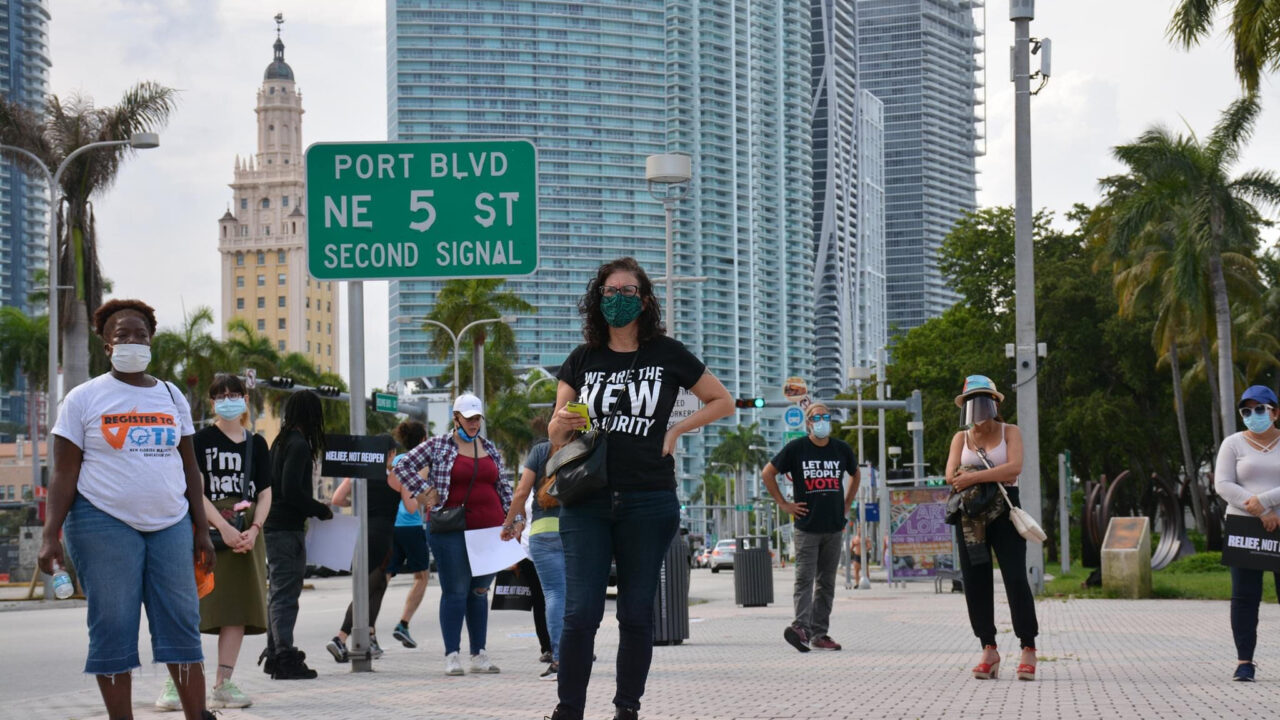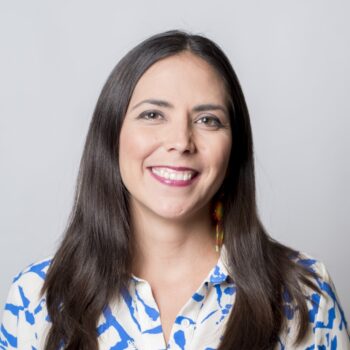On the eve of the Florida primary in March, it became clear that the new and not fully understood coronavirus was a threat we all needed to take very seriously. As we grappled with our new reality — disinfecting our groceries, keeping our distance from friends and family, schooling our children from home — New Florida Majority and our allies shut down the most ambitious voter contact plan we had ever embarked on together. We suspended our canvassing operations and our in-person voter registration and member meetings. We closed our offices. With a primary election days away, we didn’t have the luxury of taking a time out. We pivoted in less than 48 hours to a massive phone operation.
Over the next two months, we adapted our scripts from voter engagement to wellness calls. Between March and May, 200 democracy organizers with the New Florida Majority Education Fund called over one million Floridians and spoke with over 21,000 people to ask them how the pandemic was affecting their lives and well being. Each call surveyed the impact of COVID on voters’ employment, health, and housing, crucial input for us to assess the needs of our communities.
Organizers are used to operating in crisis. While our crew figured out Zoom meetings and navigated how to take our monthly People’s Assemblies — inspired by organizers in Jackson, Mississippi — online, we also fought to get mutual aid into the hands of working people who were being laid off in record numbers. Organizers distributed cash assistance at food lines and encouraged people to call our head-in-the-sand governor to urge him to fix the failure of our unemployment system and demand more relief. We delivered hundreds of gift cards by mail to families we identified as in need through our phone conversations.
By mid-summer, the negligence of our governor’s pandemic response meant that each of us was now grieving those we had already lost and caring for those who were ill while organizing for an election result that could give us hope of a different government response.
Organizing during the pandemic took its toll. As we continued to design programs for the election, the pandemic, and the protests for Black lives, each of us had to assess what level of exposure we were willing to risk for ourselves and those closest to us. Together with the Florida for All coalition, we reworked our political plan, pivoting from primarily canvassing to expanding our existing phone-banking and strategic communications work. We might not have been able to go to churches, knock on doors, or hold the same kinds of cultural events we innovated in the 2018 Governor’s race, but we were determined to bring cultural authenticity to our work, develop communications strategies in three languages, demand candidates respond to the needs of our communities, and organize volunteers from across the state and the country. We had made a commitment to equitable investment in Black and Latinx voter engagement, regardless of donor fixation, and we remained committed to deep engagement with Black, Latinx, and faith-based communities, along with women and young people.
The social and economic interruption to business as usual reminded us of organizing basics: the impact of one-on-one connection and conversation, the power of music, the importance of communicating across difference, the ways turning towards one another helps us achieve greater understanding and advances healing. Some of our online events succeeded, curating rich exchanges. We did online political education sessions for hundreds of people in multiple languages. Meanwhile our phone-bank team relentlessly made calls. But we struggled with how to create a sense of community when we were isolated.
The level of crisis facing our communities, and the disappointing results of the democratic primary, were stark reminders of how much more power we need to build. We asked ourselves if we would regret staying home while the Trump campaign was still knocking doors and holding super-spreader rallies. We monitored Florida COVID cases obsessively, gathering remotely every Monday with partners to review where we were, discuss how to hold elected officials responsible in their lack of response, and look for signs that it might be safe to expand our tactics to include in-person activity again.
When cases subsided in late August to ten cases per 100,000, we put in calls to epidemiologists to help us figure out how to go door to door as safely as possible. We developed safety guidelines — canvassers would need to wear masks at all times; we would launch canvasses outside and debrief them by phone — and we ramped up a massive paid canvass, as well as a lit drop program for our volunteers. We focused on engaging communities of color and less likely voters, many of whom had been laid off or were working from home. Our contact rates were higher than ever. More than one in four people answered their doors, and many of them expressed a commitment to voting. By the end of October, we had knocked over a million doors and collected 109,151 Biden support IDs. Once early voting started, we began holding Get Out the Vote events several times a week. We had live Haitian and Colombian music, DJs, colorful chiva buses. We partnered with graffiti artists to put up murals and set up selfie stands at polling sites to promote peer-to-peer voting. We gave it heart, all while flexing the disciplined data-driven muscle we’ve been building for years to measure the efficacy of our digital, phone, and in-person contact.
As we all know, Election Day came with some disappointing results. Florida’s 29 electoral votes went to Republicans, and we suffered some hard down-ballot losses. Still, we elected several of our members and dozens of progressive champions to local and statewide offices. We won seventy of our 108 Florida for All general election races, and we won another 25 races outright in the primary. Duval county, where New Florida Majority has been steadily organizing for over seven years, went blue for the first time in a presidential election since the 1970s, and our first organizer in Jacksonville, Angie Nixon, is now a state representative (HD 14). Miami Dade county was wrested from Republican control after close to twenty years; we elected our first woman mayor: longtime progressive Daniella Levine Cava. Movement forces were also critical to passing a ballot initiative to increase the state’s minimum wage to $15 — a victory that will raise the standard of living for 2.5 million Floridians.
There are deep lessons for all of us to learn from the 2020 race. One of them is from the multiple innovations groups were forced to make, with no lead time, to maintain connection and address the multiple, intersecting crises within our communities. When people from directly impacted communities lead the work, we understand the pain as well as the nuances of our communities and will go to great lengths to find solutions to the challenges we face.
Another lesson is the lasting power of in-person organizing — which the GOP has invested in far more than the Democratic Party. Look no further than the massive Koch-funded Libre initiative in the state, which provides year-round services aimed at Hispanic communities, from English classes to job training, as part of its mission to recruit and train the next generation of conservative leaders and organizers. The right also leveraged the power of the bully pulpit. Trump has visited Florida 44 times since 2018, more than Arizona, Pennsylvania, and Michigan combined. The Republicans had no regard for the public health crisis we faced. Their early investment in the state produced surround-sound messaging over WhatsApp, on the radio, and in the papers; Trump flag-waving caravans; and, ultimately, turnout that our forces were unable to beat.
We need to invest in our own organizing programs early and often. While many progressive funders have shifted to year-round support and early investment, the bulk of resources we rely on for election organizing are non-partisan — and political resources pour in so late in the game that we cannot use them as effectively. We could not counter the early and steady investment by right-wing forces in year-round organizing and political maneuvering with the influx of resources that came in the final eight weeks from the Biden campaign and independent expenditures. If the left wants to compete, we need to invest in building the organizing infrastructure in our communities that can rival the GOP’s.
Over the next four years, we will need to continue to deepen independent political organizing across the state, deliver wins people can feel in as many places as possible, expose the negligence and failure of right-wing leadership in the worst public health crisis we have faced in our lifetimes, and communicate clearly across every medium. New Florida Majority is excited to be merging with Organize Florida in January as an important step towards building the strong, statewide progressive infrastructure we need.
We are proud to be part of the effort that forced Trump to deepen his investment in Florida, helping to create conditions where power-building organizations in Pennsylvania, Wisconsin, Michigan, Arizona, and Georgia could deliver the victory we all needed to give our communities a fighting chance. There are more stories to be told. Election Day data to be analyzed. Strategy to be developed. But as the work continues to win the two Senate seats in Georgia, it’s encouraging to see Black and Latinx power-building groups pushing forward for the transformative change we need to put people and the planet first.

